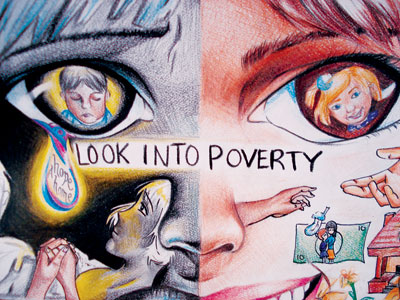All Nonfiction
- Bullying
- Books
- Academic
- Author Interviews
- Celebrity interviews
- College Articles
- College Essays
- Educator of the Year
- Heroes
- Interviews
- Memoir
- Personal Experience
- Sports
- Travel & Culture
All Opinions
- Bullying
- Current Events / Politics
- Discrimination
- Drugs / Alcohol / Smoking
- Entertainment / Celebrities
- Environment
- Love / Relationships
- Movies / Music / TV
- Pop Culture / Trends
- School / College
- Social Issues / Civics
- Spirituality / Religion
- Sports / Hobbies
All Hot Topics
- Bullying
- Community Service
- Environment
- Health
- Letters to the Editor
- Pride & Prejudice
- What Matters
- Back
Summer Guide
- Program Links
- Program Reviews
- Back
College Guide
- College Links
- College Reviews
- College Essays
- College Articles
- Back
Rising Poverty: Effect on the Youth
Poverty, simply defined as the state of being extremely poor, has overtaken our nation. As of 2011, America’s poverty rate was at 15%, or about 46.2 million people in poverty. As of 2012, the poverty rate increased to 50 million Americans. With our youth in households, where parents are finically unstable, what will be the future of youth? With 21.9% of youth in poverty how will this affect the youth’s future? Will they have any chances at college? Will they follow in the footsteps on their parent and produce offspring which they can’t take care of? How have people in states such as Oregon, been able to survive the modern Great Depression? What are some things that the youth can do to help prevent poverty? The youth is our future, and our future is in jeopardy.
One in four children in Oregon lives in poverty. Since the start of the recession, Oregon’s poverty rate has increased five consecutive years since the beginning of 2007. In 2007, the year prior to the recession, 12.9% of Oregonians lived below the poverty line. By the year of 2011, the poverty rate reached 17.5%. During that period, nearly 190,000 Oregonians fell below the poverty line. This data basically writes in stone that children will not have enough money to attend college and money from colleges would be scarce. The competition for scholarships will become increasingly high and the number of students in college will drop a substantial number. As for adults, as the poverty rates increases, the number of foreclosures all across the state will increase as well.
Poverty affects graduation rates as well. In states such as Oregon, if forty-five students enrolled in a four year full time college position, only twenty-nine of those students would graduate. As compared to the state of North Dakota, if sixty-eight students enrolled in a full time college position, forty-nine of those students will graduate. There are few graduates that graduate from a low class society. Everybody knows that job qualifications have become high. It is hard to find jobs even now with poverty rates not as high as they could be. Even McDonalds requires a high school diploma in order to get hired.
As poverty increases, change occurs all across the nation. How will the youth do things to prevent this epic situation? How will they protect themselves from becoming a dependent in a low class society? The youth can start saving at the lowest age of two. “A penny saved is a penny earned”, I learned this at a young age, becoming fascinated with banking and money. I begged my mom for toy banks which I could save all my money. Kids can save for future college cost or other essentials they may need. Kids can turn in can products in order to get money for recycling. This is a great way for helping the environment and yourself. Even in my community there are admirable kids in grocery store parking lots, helping their neighbor’s bag and bring groceries to their car for a small fee. Or a child can volunteer to take out people’s trash for a small fee, or help a senior citizen clean their house and get around.
Poverty affects everything in your life; from living standards and even your chances at attending college. Poverty doesn’t discriminate. It takes advantage of the most vulnerable people. It feeds on the weak and the lonely. Our nation needs to take the necessary precautions for avoiding poverty and homelessness. Even the simplest things like collecting cans and taking out trash can impact in a big way. Let’s work together to help decrease the numbers in poverty.

Similar Articles
JOIN THE DISCUSSION
This article has 0 comments.
